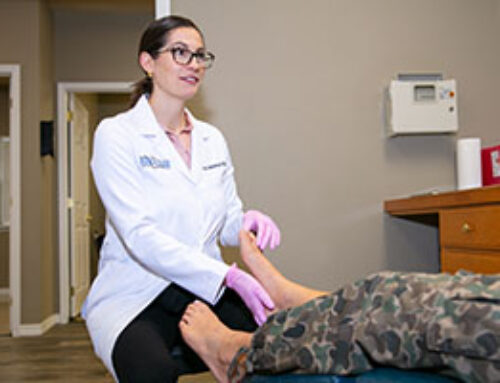Neuropathy, specifically of the feet and ankles, affects millions of people worldwide, often leading to pain, numbness, and a reduced quality of life. Neuropathy is nerve damage and can occur due to several reasons and should not be ignored as untreated cases may lead to further complications. But there is hope for recovery with treatment.
What is neuropathy?
Neuropathy refers to damage or dysfunction of the peripheral nerves, which can impact sensation, movement, and bodily functions. When the feet and ankles are affected, it’s often called peripheral neuropathy. According to the Cleveland Clinic, peripheral neuropathy results from damage to the nerves that carry signals between the brain, spinal cord, and the rest of the body.
How do you know if you have neuropathy?
Neuropathy of the feet and ankles may present in several different ways. The Mayo Clinic identifies common symptoms of neuropathy as:
- Numbness in feet or tingling – Many people describe the sensation as “pins and needles” or as if their feet have fallen asleep or a gradual onset of numbness.
- Burning pain or sensitivity to touch – This can be especially bothersome at night.
- Weakness in the muscles – Difficulty moving the toes, foot drop, lack of coordination, and paralysis.
- Loss of balance and coordination – A condition leading to frequent falls.
- Sharp, jabbing pain – This can occur spontaneously or in response to touch.
Early detection is key. If you’ve noticed these symptoms, you may already be experiencing the onset of neuropathy.
What causes neuropathy?
Several factors can contribute to neuropathy, with diabetes being one of the most common causes. According to Medical News Today, diabetic neuropathy affects approximately 50% of people with diabetes. Other causes of neuropathy include:
- Injury or trauma to the nerves in the feet and ankles.
- Infections like Lyme disease or shingles.
- Autoimmune disorders such as lupus or rheumatoid arthritis.
- Vitamin deficiencies, particularly B12.
- Alcohol use can lead to nutrient absorption issues.
- Chemotherapy and other toxic exposures that damage nerve tissue.
What could it be if it’s not neuropathy?
Many patients experience symptoms that are like neuropathy, but upon evaluation, the issue is something else. Here are some common conditions that mimic neuropathy that a podiatrist can identify and treat:
- Plantar fasciitis – When the plantar fascia, a band of tissue running along the bottom of your foot, becomes inflamed it causes tingling or burning sensations.
- Tarsal tunnel syndrome – When the posterior tibial nerve, located near the ankle, becomes compressed, it can cause burning pain, tingling, or numbness in the foot.
- Morton’s neuroma – A thickening of tissue around the nerves leading to the toes. This can cause pain, numbness, or tingling in the ball of the foot and toes and is treated differently from neuropathy.
- Flat feet – Flat feet can cause abnormal stress on muscles, tendons, and nerves in the feet, leading to discomfort, tingling, and numbness that may mimic neuropathy. Orthotics or physical therapy often resolve these symptoms.
Seeking treatment for neuropathy in legs and feet
A thorough evaluation by a Metro Tulsa Foot & Ankle podiatrist can help pinpoint the exact cause of your discomfort and guide you to the appropriate treatment. If you suspect you have neuropathy, it’s important to visit a professional for a full assessment.
How do podiatrists treat neuropathy?
A podiatrist specializes in foot and ankle health and can provide a comprehensive evaluation to determine the extent of your neuropathy. During your visit, the podiatrist may:
- Perform nerve conduction studies to assess how well your nerves are functioning.
- Conduct a thorough physical exam, checking your reflexes, strength, and sensitivity to touch.
- Recommend blood tests to identify any underlying causes, such as diabetes or vitamin deficiencies.
What kind of treatment is recommended for neuropathy?
Peripheral neuropathy treatment relies heavily on the cause of the nerve damage. Hopkins Medicine reports there are more than 100 types of peripheral neuropathy, each with its own set of symptoms and prognosis.
For example, peripheral neuropathy caused by a vitamin deficiency is easily treated with vitamin therapy and an improved diet. When peripheral neuropathy is related to diabetes, careful monitoring of blood sugar levels may slow its progression.
Other treatments for peripheral neuropathy a podiatrist may suggest include:
- Medications – Pain relievers, antidepressants, or anticonvulsants to manage nerve pain.
- Surgery – Surgery can help reconnect cut nerves and relieve pain due to trapped nerves.
- Physical therapy – Strengthens muscles and improves balance.
- Custom orthotics – Provides support and reduces pressure on affected areas.
- Lifestyle modifications – Managing blood sugar levels if diabetes is a factor or taking supplements for deficiencies.
In severe cases, a referral to a neurologist or other specialist might be necessary.
Preventing neuropathy
While some causes of peripheral neuropathy are unavoidable, there are steps you can take to reduce your risk. Maintaining a healthy diet rich in vitamins and nutrients, avoiding excessive alcohol, and staying physically active are also key strategies for preventing or minimizing neuropathy.
Why early intervention for neuropathy matters
If left untreated, neuropathy can worsen over time, leading to complications like infections, ulcers, and even amputations in extreme cases. Seeing a podiatrist early can help slow the progression of the condition and provide relief from painful symptoms. It is possible to stop or reverse certain types of neuropathies if treatment begins quickly enough.
In conclusion, neuropathy of the feet and ankles is a condition that should not be overlooked. If you experience a foot problem, schedule an appointment with one of the physicians at Metro Tulsa Foot & Ankle Specialists today. Detecting and treating foot problems as early as possible can lead to faster recovery and prevent complications.
The information, text, graphics, images, and other material contained on this website are for informational purposes only. No material on this site is intended to be a substitute for professional medical advice, diagnosis, or treatment. Always seek the advice of your physician or other qualified health care provider with any questions you have regarding a medical condition or treatment and before undertaking a new health care regimen, and never disregard professional medical advice or delay in seeking it because of something you read on this website.
Subscribe to stay up-to-date on news and tips from us.





